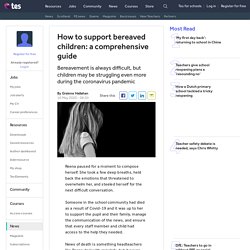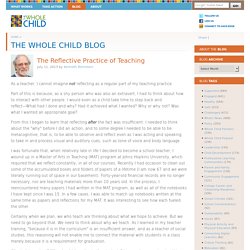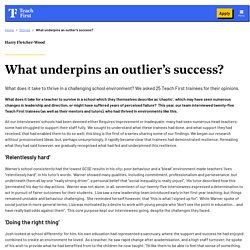

Webinar - ClassCharts. Wellbeing Webinar 2. Tes. Reena paused for a moment to compose herself.

She took a few deep breaths, held back the emotions that threatened to overwhelm her, and steeled herself for the next difficult conversation. Someone in the school community had died as a result of Covid-19 and it was up to her to support the pupil and their family, manage the communication of the news, and ensure that every staff member and child had access to the help they needed. Top tips for managing well-being on the Teach First training programme. Explore Strategies. Students see little value in the course or its content.

Regardless of the objective value of an activity or topic, if students do not recognize its value, they may not be motivated to expend effort. However, if students clearly see how coursework connects to their goals, interests, and concerns, they will be more likely to value it, and thus more motivated to invest time and effort. Clearly articulate learning goals. The Reflective Practice of Teaching. As a teacher, I cannot imagine not reflecting as a regular part of my teaching practice.

Part of this is because, as a shy person who was also an extravert, I had to think about how to interact with other people. I would even as a child take time to step back and reflect—What had I done and why? Had it achieved what I wanted? Why or why not? Investigacio professors eficients. Wellbeing: 3 reasons teachers don't leave my school. When I hear concerns about teacher wellbeing, I am often left frustrated by the short-term, tokenistic measures that are suggested, such as buying cakes for the staffroom.

This is fine as a nice gesture, but it won’t make any difference if my day job is characterised by being overworked or undervalued. The high percentage of teachers that leave the profession every year clearly reflects that more needs to be done. As a school, we have been very successful in retaining our teachers as well as recruiting, which is, in part, due to a focus on staff wellbeing based on structural and cultural change that ensure all teachers have a sense of worth and feel valued. Boosting teacher wellbeing Our approach can be neatly summarised in these three points: 1. The greatest factor that impacts on children’s learning is the quality of teaching, and the greatest factor that impacts upon the quality of teaching is the quality of teacher learning. Gentrification-what-role-do-schools-play?j=14064609&e=gbgeorgie@hotmail. The quirky café selling vegan food moves in first, and the cupcake shop soon follows.

It is not until the old boozers start calling themselves gastropubs, though, that the vacant premises on the high street start to fill up with estate agents. Student mental health: how schools can boost wellbeing. Schools can and should be contributing positively to the mental health and wellbeing of our students at a time when mental health problems may be experienced by a shocking one in five adolescents in any given year.

Business leaders expressed the same worry at a recent hospitality industry conference I attended, voicing concern about the rise in absences and the resulting drop in productivity largely caused by deteriorating mental health among employees. Schools are also concerned at statistics that keep emerging about mental health: globally, a leading cause of illness is depression, while suicide is the most common cause of death in under-35s. Many young people simply aren’t equipped with the resources they need to cope after they leave school and enter the world of work. Tes-focus-onuniforms-and-behaviour?j=14053137&e=gbgeorgie@hotmail. How to cut workload with effective communication. Communication is one of the biggest factors in the functioning of a school.

But if it’s not happening effectively, it creates workload and stress. Although schools generally have policies and guidelines around communication, the expectations of staff are often neglected. Quick read: 4 (really) quick workload wins for planning lessons Quick listen: How much of your lesson should be teacher talk? Becoming a Better Teacher by 'Deliberate Practice' “I fear not the man who has practiced 10,000 kicks once, but I fear the man who had practiced one kick 10,000 times.”

Bruce Lee When I was a young boy I dreamt of being like Bruce Lee. He had complete mastery over his body and mind. He was a genius who could also beat anybody up, if required…crucial for a young, bespectacled light-weight like me! I remember owning a book on ‘Hung Ga Kung Fu‘ – only, I never did commit myself to the training. After dabbling with a few thousand hours of football practice over the years, without expertise, the next great passion became the pursuit of becoming an expert teacher. The ‘Twelve Bridges’ of ‘Hung Ga Kung Fu’ provide excellent behaviour management poses for the discerning teacher! How Good Is Your Time Management? - from MindTools.com. © iStockphotorobas Are you keeping track of time?
How often do you find yourself running out of time? Weekly, daily, hourly? For many people, it seems that there's just never enough time in the day to get everything done. What underpins an outlier’s success? What does it take to thrive in a challenging school environment?

We asked 25 Teach First trainees for their opinions. What does it take for a teacher to survive in a school which they themselves describe as ‘chaotic’, which may have seen numerous changes in leadership and direction, or might have suffered years of perceived failure? This year, our team interviewed twenty-five Teach First trainees (as well as their mentors and tutors), who had thrived in environments like this.
All our interviewees’ schools had been deemed either Requires Improvement or Inadequate; many had seen numerous head teachers; some had struggled to support their staff fully. Not getting along? 5 ways to avoid a staffroom scene. How to remove gender stereotypes from schools. “What a beautiful little girl!

Schools 'need to be more female-friendly' Here we are on the verge of a new decade in teaching. In a new spirit of openness, we’re at last realising the importance of making sanitary products available to adolescent girls to enable them to attend school every day of the month. Yet increasingly we have one of the most female-unfriendly environments to work in because of the ways in which the school day has been restructured. Workload and presenteeism are part of the reason why teaching has become so tough on the wellbeing of any teacher, as shown in Emma Kell’s most recent article. But it’s particularly tough on the female body at all stages of our lives. Why we have a teacher wellbeing crisis. It’s been a crazy fortnight, hence the radio silence. In recent days, I’ve met hundreds of educators in different parts of England. I’ve been inspired daily, challenged in my thinking, moved by the talent, commitment and energy in so many rooms across the country.
BBC Two - No More Boys and Girls: Can Our Kids Go Gender Free?, Gender neutral education. Schools are full of harmful sexist language. As an ex-English teacher, I am fully aware just what a paradox our language is: simultaneously organic and full of rules. Our choice of vocabulary can repel or bring people together and its meaning can change several times within a lifetime. Language is also one of the most powerful means of reinforcing gender discrimination and sexism in our schools. Wellbeing: Should you count down to the holidays? Hold on to your hats, here’s a revelation for you: teachers work extremely hard and look forward to their holidays. The autumn term is usually the longest and can feel interminable as the days shorten and the temperature drops.
But is counting down the days until we can don a ridiculous jumper and eat our body weight in Quality Street a positive thing to do? For starters, the social media countdowns can be extremely irritating: “Only two weeks, five hours, 23 minutes and nine seconds until I’m sunning myself #Blessed”.